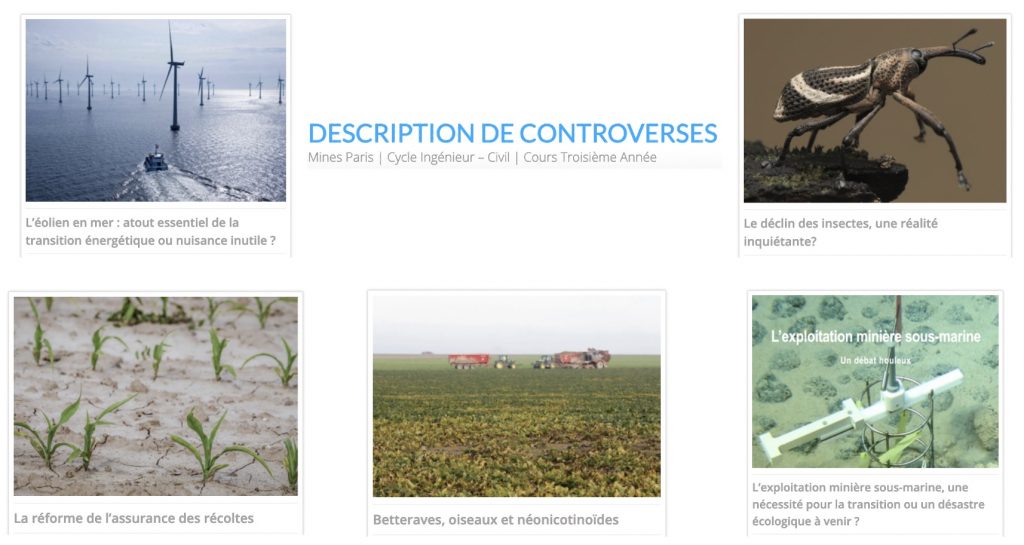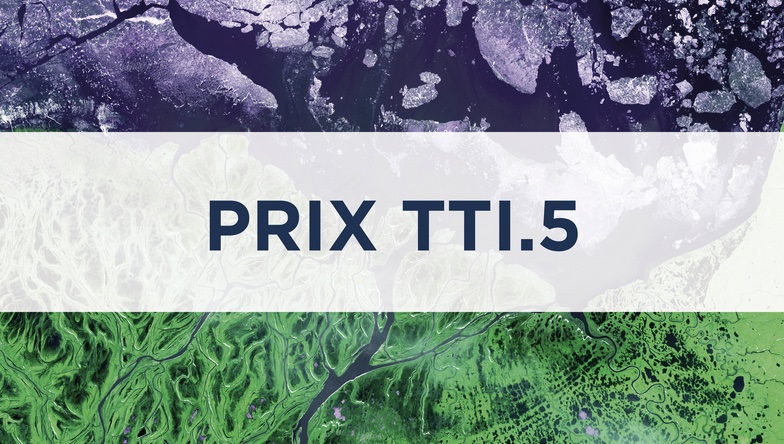
“Beets, birds and neonicotinoids”, best case study
of an environmental controversy
from the course Description of controversies
The Transition Institute 1.5 launched its first edition of the TTI.5 Award for best study of an environmental controversy on May 31st, 2023 at the Maison de l’Océan in Paris. The prize is awarded to the best case study of a controversy dealing with an environmental issue, selected among the papers written by students of the civil engineering program of Mines Paris–PSL. These controversy studies are carried out as part of the course Description of Controversies coordinated by Madeleine Akrich, sociologist and Research Director at the Center for the Sociology of Innovation (CSI).

TTI.5 1st Forum, 31 May, 2023 © Frédérique Toulet
The winning group formed by Sylvain Caillaud, Arsène Ferrière, Grégoire Michel, Léopold Moeneclaey, Aymeric Plessier, Joseph Redaud, Victoire Rossignol and Maud Roux-Salembien was rewarded for its study entitled « Betteraves, oiseaux et néonicotinoïdes. To bee or not to beet? » [Beets, birds and neonicotinoids]. This study examines the controversy surrounding the derogations granted for the use of neonicotinoids in sugar beet production.
Warnings that neonicotinoids were dangerous for the environment led to a ban on their use in 2018. The ban became effective from 2020, but a change in the law allowed derogations for beet crops, if necessary until 2023.
The year neonicotinoids were banned, a large number of fields were affected by jaundice, and yields dropped. The extent of the damage suffered by the sugar beet industry is the subject of debate, as is the responsibility of the neonicotinoid ban in this “jaundice crisis”. All parties involved agree on the difficulty of assessing the risk of jaundice occurrence. The French General Confederation of Beet Growers (CGB) sees it as a reason to protect farmers in the face of economic uncertainty, while this uncertainty is presented as grounds for preserving ecosystems by environmental organizations. Opponents of the derogation argue that rather than the ban on neonicotinoids, the primary causes of the crisis are both the industry’s failure to seek alternatives and the international competition.

The derogation’s legitimacy is mainly examined in the light of alternatives to neonicotinoids. Although alternatives exist for beet crops, there is no consensus on their efficacy or whether they would be operational once the ban came into force.
With a derogation that fails to satisfy any of the players, the blame is laid at everyone’s door, and the legitimacy of all involved is attacked. The decision-making process is called into question, in particular the approval of pesticides, in which opponents of neonicotinoids suspect conflicts of interest. It is interesting to note the wide range of actors involved and the links they maintain within the decision-making spheres related to the controversy.
The award was presented during the 1st TTI.5 Forum “Security issues related to climate change” by Matthieu Mazière, Director of the Civil Engineering Education Program at Mines Paris-PSL.
Controversy study projects at Mines Paris – PSL
The course Description of Controversies is part of the curriculum for third-year students in the Civil Engineering program at Mines Paris-PSL. This course aims to educate engineering students about the evolution of their professional and civic context. The aim is to introduce them to the uncertain world of scientific and technical research by describing an object: a socio-technical controversy.
This exercise was first proposed by Michel Callon, then by Bruno Latour, and has constantly evolved since its inception. Its roots lie in Science and Technology Studies, which developed the idea that, in order to understand how science and technology contribute to the construction of the social world, situations need to be addressed when things have not yet stabilized and when the relationships between science, technology and society are being debated.
Why teach about controversies, especially to future engineers?
This course involves to foster the understanding amongst students that technical devices do not provide “neutral” answers to “objectively” defined problems. A technical device embodies a definition of the environment, in the broadest sense, in which it is supposed to take place, the needs or demands it responds to, users’ capabilities, forms of relationship between different economic actors, etc. A number of these elements may not even be visible to the promoters of these devices, and only emerge in the debates generated by the controversy. In a nutshell, the goal is to make it clear that researchers and engineers are not outside the debate, but are actually “committed” by the choices they make about research topics or device design.
It is also about raising students’ awareness of the importance of problem definition: in controversies, and particularly in environmental controversies, debates over what constitutes the issues to be addressed are particularly intense. For instance, are irrigating farmers still to be guaranteed water availability through the construction of substitutional reservoirs, also known as megabassines, or is it necessary to transform agriculture to make it resilient in the face of climate change? Clearly, the way in which the problem is posed partly determines the nature of the responses that might be envisaged.
And, finally, it is about showing them that recognized “experts” have no monopoly on relevance: faced with complex, multi-dimensional issues, citizens and activists can bring certain problems to light, contribute new knowledge and propose alternatives.
In other words, controversies are not a social aberration, but often a means of advancing both knowledge and technical democracy.
The topics proposed to the students to support this program have the following characteristics: an ongoing controversy, on a targeted subject (for example: not “GMOs” but “the problems raised by the authorization of the cultivation of a transgenic potato plant which is controversial in a specific period of time and in a specific territory”), involving a diversity of protagonists (scientists, experts, jurists, institutions, members of parliament, associations, etc.), and about which various sources of information are available (general press, scientific press, professional press, discussion forums, blogs, websites, parliamentary reports, etc.).
A controversy study consists in a case study. A group of students follows a controversy in real time to discover its complexity and singularity. A team of sociologists specializing in the analysis of science and technology supervise the students in the development of a pragmatic and argued empirical point of view.
The 5 projects nominated for the TTI.5 Award for best study of an environmental controversy
The prize was awarded to the best study project by public vote, following a presentation of the 5 nominated projects at the 1st TTI.5 Forum “Security Issues in Climate Change”. These 5 projects were those that received the highest marks in the written examination of the environmental controversy study projects, demonstrating their depth of analysis

« Betteraves, oiseaux et néonicotinoïdes » [Beets, birds and neonicotinoids] by Sylvain Caillaud, Arsène Ferrière, Grégoire Michel, Léopold Moeneclaey, Aymeric Plessier, Joseph Redaud, Victoire Rossignol and Maud Roux-Salembien
« L’éolien en mer : atout essentiel de la transition énergétique ou nuisance inutile ? » [Offshore wind power: an essential asset for the energy transition or an unnecessary nuisance?] by Matthias Avice, Cynthia Balech, Maëlle Baronnet, Myrtille David, Shuyu Ding, Xinbei Jang, Louis Pont and Matthieu Suire
« Le déclin des insectes, une réalité inquiétante ? » [The decline of insects, a concerning reality?] by Jorge Luis Ardila Villabona, Jeremy Costanzo, Candice Courbière, Antoine Gauchot, Jeanne-Marie Hays, Sophie Laperrouze, Stephen Piet and Léo Simplet
« La réforme de l’assurance des récoltes en France. Quels enjeux et débats autour de la loi du 22 mars 2022 ? » [The reform of crop insurance in France. What are the issues and debates surrounding the March 22, 2022 law?] by Damien Caperaa, Jean Catry, Jean Baptiste Flieller, Pierre Frode, Loïc Fouquet, Corentin Hennion, Thomas Labro and Lucille Lacoste
« L’exploitation minière sous-marine, une nécessité pour la transition ou un désastre écologique à venir ? » [Undersea mining, a necessity for transition or an ecological disaster in the making?] by Youmna Bahout, Timothée Blondel, Théophile Candela, Alice Dagicour, Quentin Guitet, Marine Papet, Maïlys Quilhot and Léa Trin


